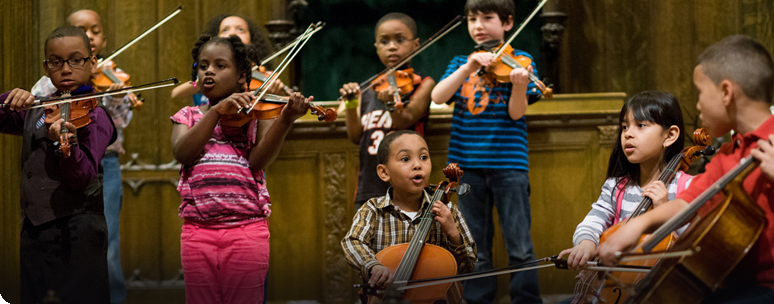Doing the Math: the Daily Orchestra Program

“Woah,
there’s some math in here!” exclaimed Diego, a second-year cellist in the Daily
Orchestra Program, during a simple music game involving subtraction. I realized
he had just given us evidence of what the New York Times and cutting-edge
scientific studies tell us every so often – that music and math are connected
and therefore music education can help students develop their math skills. Now
that the Daily Orchestra Program has been back in session for almost a month I
have been witnessing the daily proof that music education encompasses so much
more than just music, including but certainly not limited to math.
Four
weeks ago Adrienne and I hauled our equipment into Federal Hill House and
welcomed a brand new class of second-graders to the Daily Orchestra Program.
Each member of our new class of 20 was eager to begin the process of learning a
musical instrument. Until November this process will include things like
getting to know each other, playing games, singing songs, clapping and drumming
rhythms, listening to music and stories, and becoming familiar with all the
instruments of the orchestra, especially those of the string family. Our young
musicians are enthusiastic learners, and even on the second day I could hear
them joyfully singing the songs we learned the day before while they lined up
for music time outside our room.
Last
year’s orchestra has also reunited, with some members now graduated to larger
instruments than before. After a little bit of time spent re-familiarizing them
with their instruments and with each other following the long summer hiatus,
Adrienne and I realized they were so eager to play music that we couldn’t keep
them from learning new pieces for very long. Now, each afternoon they’ve been
working hard to polish Hot Cross Buns and Boil ‘em Cabbage Down.

Last
Friday one of our favorite regular guests and CMW board member, Mark Hinkley, visited and took us on
an imaginary journey back to a time in history when human beings did not yet
have language. Our students brainstormed about ways in which people might have
communicated and wondered if one of those ways was music. Perhaps string
instruments were not an ancient means of music-making, but I’ve often wondered
if music was the original language. At the very least it is an ancient one, and
perhaps that is why it has such all-encompassing relevance. Through music we
can communicate ideas and emotions with each other without having to say a
word. It’s no wonder then that the skills involved in learning a musical
instrument would have sweeping benefits for an individual’s life, not just in
terms of critical thinking and mind/body coordination but also in terms of
identifying with and communicating with others.
As
the Daily Orchestra Program enters our second year I am so excited to see our
students continue to grow and develop all these skills, as Diego and his
friends learn to communicate in deep and delightful ways through the powerful
language of music.
-Lisa Barksdale
|


